- Home
- Louisa May Alcott
Little Vampire Women Page 15
Little Vampire Women Read online
Page 15
“I know you will, and I’m ever so much obliged. You are always a great comfort to me, Teddy,” returned Jo, gratefully shaking hands.
“Well, now, don’t be dismal, there’s a good fellow. It’s all right you see. Meg is happy, Brooke will fly round and get settled immediately, Grandpa will attend to him, and it will be very jolly to see Meg in her own little house. We’ll have capital times after she is gone, for I shall be through college before long, and then we’ll go abroad on some nice trip or other. Wouldn’t that console you?”
“I rather think it would, but there’s no knowing what may happen in three years,” said Jo thoughtfully.
“That’s true. Don’t you wish you could take a look forward and see where we shall all be then? I do,” returned Laurie.
“I think not, for I might see something sad, and everyone looks so happy now, I don’t believe they could be much improved.” And Jo’s eyes went slowly round the room, brightening as they looked, for the prospect was a pleasant one.
Father and Mother sat together, quietly reliving the first chapter of the romance which for them began some 130 years ago. Amy was drawing the lovers, the present half of whom sat apart in a beautiful world of her own, the light of which touched her face with a grace the little artist could not copy. Beth lay on her sofa, talking cheerily with her old friend, who held her little hand as if he felt that it possessed the power to lead him along the peaceful way she walked. Jo lounged in her favorite low seat, with the grave quiet look which best became her, and Laurie, leaning on the back of her chair, his chin on a level with her curly head, smiled with his friendliest aspect, and nodded at her in the long glass which reflected them both.
So the curtain falls upon Meg, Jo, Beth, and Amy. Whether it ever rises again, depends upon the reception given the first act of the domestic drama called Little Vampire Women.
PART TWO
Chapter Eighteen
GOSSIP
In order that we may start afresh and go to Meg’s wedding with free minds, it will be well to begin with a little gossip about the Marches. And here let me premise that if any of the elders think there is too much “lovering” in the story, as I fear they may (I’m not afraid the young folks will make that objection), I can only say with Mrs. March, “What can you expect when I have four gay girls in the house, and a dashing young neighbor over the way?”
The three years that have passed have brought but few changes to the quiet family. The war is over, and Mr. March safely at home, busy with his books and the small parish which found in him a minister by nature as by grace, a quiet, studious vampire, rich in the wisdom that is better than learning, the charity which calls all humankind “brother,” the piety that blossoms into character, making it august and lovely.
These attributes, in spite of poverty and the strict integrity which shut him out from the more worldly successes, attracted to him many admirable vampires, as naturally as sweet herbs draw bees, and as naturally he gave them the honey into which two hundred fifty years of hard experience had distilled no bitter drop. His good book was the holy bible, the exact one human ministers preached out of daily, and his lessons were the same: do unto others, love thy neighbor. His “humanitarian” philosophy of treating all people with respect was, just as John Brooke and his cohorts had feared, starting to spread and grow beyond the small “cult of humanity” community where it was founded.
To outsiders the five energetic women seemed to rule the house, and so they did in many things, but the quiet scholar, sitting among his books, was still the head of the family, the household conscience, anchor, and comforter, for to him the busy, anxious vampire women always turned in troublous times, finding him, in the truest sense of those sacred words, husband and father.
The girls gave their hearts into their mother’s keeping, their souls into their father’s, and to both parents, who lived and labored so faithfully for them, they gave a love that grew with their growth and bound them tenderly together by the sweetest tie which blesses life and outlives death.
Mrs. March is as brisk and cheery, and no more grayer, as when we saw her last, and just now so absorbed in Meg’s affairs that the hospitals and homes still full of wounded “boys” and soldiers’ widows, decidedly miss the motherly missionary’s visits.
John Brooke did his duty manfully, rising to the demands of his new life with all the enthusiasm his young fiancée could hope for. A fighter by nature, he eagerly traded one cause for another, happily adopting the vampire struggle as his own. His loyalty to Meg developed with equal swiftness, for he was profoundly grateful to her for bestowing on him invincibility and immortality. Though he’d found her insipid and gullible in life, in death he found her delightful and blissfully fell in with her plans for their future.
The adjustment wasn’t without its challenges, for Brooke dearly loved the taste of human blood as well as the acquisition of it. But through Meg’s patient instruction, for he was the student now, he learned to control his impulses and even gained an appreciation for deer’s blood, which had some of the tang of the human variety. His progress during those three years was everything his prospective in-laws could be proud of and they happily cheered him on when he refused Mr. Laurence’s more generous offers, and accepted the place of bookkeeper, feeling better satisfied to begin with an honestly earned salary than by running any risks with borrowed money. They were also proud of the way he named all his coconspirators in the plot to kill the Marches, and he abjectly apologized to Beth for causing her a moment’s unease with the chilly death. He’d only targeted her for execution because she had so skillfully and so smoothly deflected the stake aimed at her sister’s heart by Fred Vaughn, an observation that further enflamed Jo’s resentment, for she hated to think of any sister being worthy of execution save herself.
Meg had spent the time in working as well as instructing her beloved in his new life, growing womanly in character, wise in housewifely arts, and prettier than ever, for love is a great beautifier. She had her girlish ambitions and hopes, and felt some disappointment at the humble way in which the new life must begin. Sallie Gardiner had just gotten married, and Meg couldn’t help contrasting her fine house and carriage, many gifts, and splendid outfit with her own, and secretly wishing she could have the same. But somehow envy and discontent soon vanished when she thought of all the patient love and labor John had put into becoming the perfect vampire for her, and when they sat together in the twilight, talking over their small plans, the future always grew so beautiful and bright that she forgot Sallie’s splendor and felt herself the richest, happiest girl in Christendom.
Jo never went back to Aunt March, for the old lady took such a fancy to Amy that she bribed her with the offer of drawing lessons from one of the best teachers going, and for the sake of this advantage, Amy would have served a far harder mistress. So she gave her evenings to duty, her overnights to pleasure, and prospered finely. Jo meantime devoted herself to her training at the salon, where she was in her third year as a cadet. Graduation loomed and with it the prospect of a job with a firm or agency devoted to the defense of vampires. With John’s help, Gentleman Jackson caught all but one of his former plotters. The villain who had escaped, a fierce slayer who went by the nom de guerre Dr. Bang, had long since disappeared from the county.
Beth remained delicate long after the fever was a thing of the past. Not an invalid exactly, but never again the pale-faced, healthy creature she had been, yet always hopeful, happy, and serene, and busy with the quiet duties she loved, everyone’s friend, and an angel in the house, long before those who loved her most had learned to know it.
Laurie, having dutifully gone to college to please his grandfather, was now getting through it in the easiest possible manner to please himself. A universal favorite, thanks to money, manners, much talent, and the kindest heart that ever got its owner into scrapes by trying to get other people out of them, he stood in great danger of being spoiled, and probably would have been, like many another promisin
g boy, if he had not possessed a talisman against evil in the memory of the kind old man who was bound up in his success, the motherly friend who watched over him as if he were her son, and last, but not least by any means, the knowledge that four innocent vampire girls loved, admired, and believed in him with all their hearts.
Being only “a glorious human boy,” of course he frolicked and flirted, grew dandified, aquatic, sentimental, or gymnastic, as college fashions ordained, hazed and was hazed, talked slang, and more than once came perilously near suspension and expulsion. But as high spirits and the love of fun were the causes of these pranks, he always managed to save himself by frank confession, honorable atonement, or the irresistible power of persuasion which he possessed in perfection. In fact, he rather prided himself on his narrow escapes, and liked to thrill the girls with graphic accounts of his triumphs over wrathful tutors, dignified professors, and vanquished enemies. The “men of my class” were heroes in the eyes of the girls, who never wearied of the exploits of “our fellows,” and were frequently allowed to bask in the smiles of these great creatures, when Laurie brought them home with him.
Amy especially enjoyed this high honor, and became quite a belle among them, for her ladyship early felt and learned to use the gift of fascination with which she was endowed. Meg was too much absorbed in her private and particular John to care for any other lords of creation, and Beth too shy to do more than peep at them and wonder how Amy dared to order them about so, but Jo felt quite in her own element, and found it very difficult to refrain from imitating the gentlemanly attitudes, phrases, and feats, which seemed more natural to her than the decorums prescribed for young ladies. They all liked Jo immensely, but never fell in love with her, though very few escaped without paying the tribute of a sentimental sigh or two at Amy’s shrine. And speaking of sentiment brings us very naturally to the “Dovecote.”
That was the name of the little brown house Mr. Brooke had prepared for Meg’s first home. Laurie had christened it, saying it was highly appropriate to the gentle lovers who “went on together like a pair of turtledoves, with first a bill and then a coo.” It was a tiny house, with a little garden behind and a lawn about as big as a pocket handkerchief in the front. The house was furnished lovingly by Mrs. March and the girls, who went on many solemn shopping excursions to stock the house with all the amenities required by a new bride.
The linen closet was particularly well-stored, for Aunt March, having said she would have nothing further to do with Meg if she married “that book,”31 was rather in a quandary when the former tutor became a valuable resource in the fight against slayers. She never broke her word, and was much exercised in her mind how to get round it, and at last devised a plan whereby she could satisfy herself. A dear family friend was ordered to buy, have made, and marked a generous supply of house and table linen, and send it as her present, all of which was faithfully done, but the secret leaked out, and was greatly enjoyed by the family, for Aunt March tried to look utterly unconscious, and insisted that she could give nothing but the old-fashioned pearls long promised to the first bride.
And now Beth was there, laying the snowy piles smoothly on the shelves and exulting over the goodly array and the house was complete and ready for the bride and groom to return home replete after their wedding tomorrow.
Chapter Nineteen
THE FIRST WEDDING
Meg did not want a fashionable wedding, but only those around her whom she loved, and to them she wished to look and be her familiar self. So she made her wedding gown herself, sewing into it the tender hopes and innocent romances of a girlish heart. Her sisters braided up her pretty hair, and the only ornaments she wore were the lilies of the valley, which “her John” liked best of all the flowers that grew.
“You do look just like our own dear Meg, only so very sweet and lovely that I should hug you if it wouldn’t crumple your dress,” cried Amy, surveying her with delight when all was done.
“Then I am satisfied. But please hug and kiss me, everyone, and don’t mind my dress. I want a great many crumples of this sort put into it today,” and Meg opened her arms to her sisters, who clung about her with April faces for a minute, feeling that the new love had not changed the old.
“Now I’m going to tie John’s cravat for him, and then to stay a few minutes with Father quietly in the study,” and Meg ran down to perform these little ceremonies, and then to follow her mother wherever she went, conscious that in spite of the smiles on the motherly face, there was a secret sorrow hid in the motherly heart at the flight of the first bird from the nest.
All three girls wore suits of thin silver gray (their best gowns for the summer), with blush roses in hair and bosom, and all three looked just what they were, pale-faced, happy-hearted girls, pausing a moment in their busy lives to read with wistful eyes the sweetest chapter in the romance of vampire womanhood.
There were to be no ceremonious performances, everything was to be as natural and homelike as possible, so when Aunt March arrived, she was scandalized to see the bride come running to welcome and lead her in, to find the bridegroom fastening up a garland that had fallen down, and to catch a glimpse of the paternal minister marching upstairs with a grave countenance.
“Upon my word, here’s a state of things!” cried the old lady, taking the seat of honor prepared for her, and settling the folds of her lavender moiré with a great rustle. “You oughtn’t to be seen till the last minute, child.”
“I’m not a show, Aunty, and no one is coming to stare at me, to criticize my dress, or count the cost of my luncheon. I’m too happy to care what anyone says or thinks, and I’m going to have my little wedding just as I like it.”
But poor Meg did not get to have her little wedding just as she liked it, for no sooner were the words out of her mouth than an arrow sailed through the open window and struck her in the shoulder, enough inches away from her heart to do her no damage but close enough to disturb a fond bridegroom, who waved his hammer angrily.
“Attack!” he cried, running toward the window, right into the face of danger like a brave young vampire should do.
Meg jumped in front of her screeching aunt March, as Amy was not immediately present to provide protection, and extricated the arrow from her shoulder, bemoaning the tear that now rent her beautiful dress. Nasty, awful slayers to ruin a girl’s most special day!
“The Pendergrast Offense,”32 Jo called, dashing down the stairs as another arrow, this one alight with flames, crossed the room. “Attack during an important affair, for your targets are gathered and distracted. I should have seen this coming.”
Mr. Laurence extinguished the fire before it had time to consume the carpet and urged his grandson, who was trying to help, to seek cover. Laurie protested that he was as able-bodied as any man present to defend hearth and home, but Jo interrupted his fine speech…
“Best listen, my boy. You have a dreadfully mortal human trick about you.”
If there was anything a mortal human boy hated to be called, it was a mortal human boy, and Laurie, feeling the slight keenly, refused to move from his perch next to his grandfather.
Jo was inclined to press the matter, but with new arrows flying through the window in a constant stream, now wasn’t the time. She ran to John at the window as Amy charged into the room to relieve Meg of her responsibility. The youngest sister tried to convince her to seek refuge in the linen closet to save her dress further damage, but the bride refused to be separated from her beloved on this, their wedding day, for she had promised, or, rather, had been prepared to promise, to remain true through better or worse.
“We need to take the fight to them,” Jo said, well aware the enemy had the tactical advantage of being able to enter any establishment at will. Only vampires were handicapped by the need for an invitation.
Brooke nodded, for he knew their attacker could be only the nefarious Dr. Bang, a man whose methods his former collaborator knew much about and whose bravery extended only so far as a fast assault
and a faster retreat. Bang preferred underhanded means such as the chilly death to direct confrontation, and that he was willing to risk this attack revealed how poorly he was thinking. His main goal, indeed his only goal, was to revenge himself on his undead former ally by ruining his wedding, for even if all the players survived, the perfect memory of this perfect night would be polluted by the battle.
It was a dastardly plan, for a wedding should be held sacred by both sides of the never-ending human-vampire struggle, but it left Bang, who wasn’t an experienced field officer, on unfamiliar ground. “Now,” Brooke cried, jumping through the window a mere second before Jo, the stench of his foe’s spicy cologne filling his nostrils and clouding his vision until all he could see was his own hunger. Deer’s blood was all very good for keeping one alive but it had nothing on the vibrant, red coursing blood of a sworn enemy.
Jo arrived at the catapult first, for Brooke was still a little shaky on his “vampire legs,” and examined the mechanical device for clues, but the humans who had set it up were long gone. Try as she might, Jo could hear nothing but the rustling of the trees and her own family’s faint distressful chatter. She closed her eyes and inhaled deeply but without her allium mask could not get passed the garlicky notes in Bang’s cologne.
“A point for the slayers,” she said as John kicked the contraption that had thrown arrow after arrow at the house. He should have known it would be a cowardly trick. Dr. Bang didn’t have the cheek to risk a full-on attack.
Once Meg was assured of her bridegroom’s safety, which, in truth, she never really doubted, for she had remarkable faith in his fighting skills, she handed him the hammer again and told him to get busy, for there was much more to repair now than mere fallen garlands.
There was no bridal procession, but a sudden silence fell upon the room as Mr. March and the young couple took their places under the green arch, their bride clothes no less beautiful for the rips, stains, and burns singed upon them. Mother and sisters gathered close, as if loath to give Meg up. The fatherly voice broke more than once, which only seemed to make the service more beautiful and solemn. The bridegroom’s hand trembled visibly, and no one heard his replies. But Meg looked straight up in her husband’s eyes, and said, “I will!” with such tender trust in her own face and voice that her mother’s heart rejoiced and Aunt March sniffed audibly.

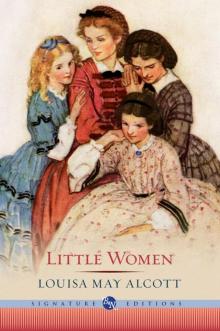 Little Women
Little Women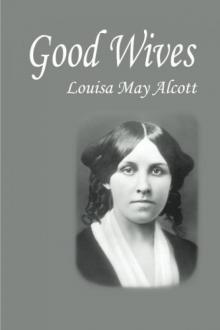 Good Wives
Good Wives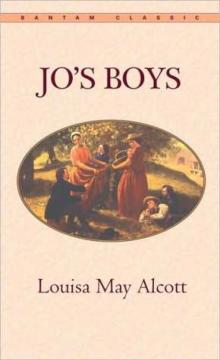 Jo's Boys
Jo's Boys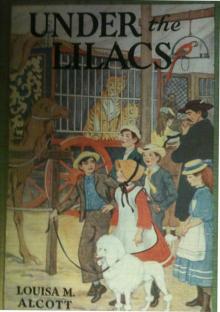 Under the Lilacs
Under the Lilacs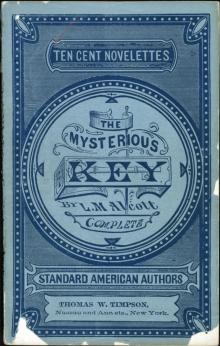 The Mysterious Key and What It Opened
The Mysterious Key and What It Opened The Inheritance
The Inheritance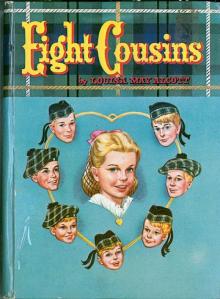 Eight Cousins
Eight Cousins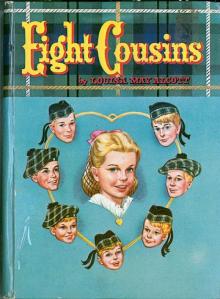 Eight Cousins; Or, The Aunt-Hill
Eight Cousins; Or, The Aunt-Hill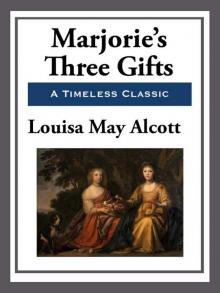 Marjorie's Three Gifts
Marjorie's Three Gifts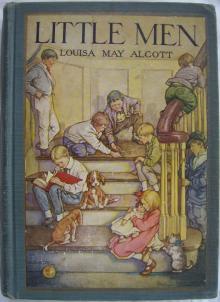 Little Men
Little Men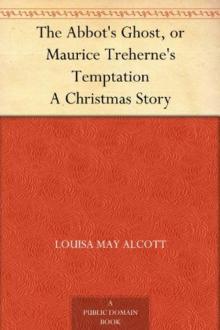 The Abbot's Ghost, or Maurice Treherne's Temptation: A Christmas Story
The Abbot's Ghost, or Maurice Treherne's Temptation: A Christmas Story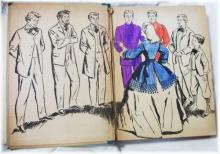 Rose in Bloom
Rose in Bloom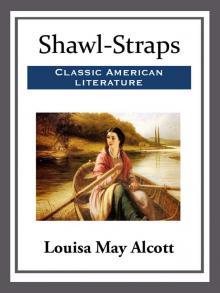 Shawl-Straps
Shawl-Straps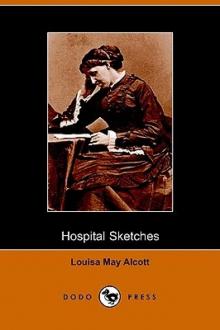 Hospital Sketches
Hospital Sketches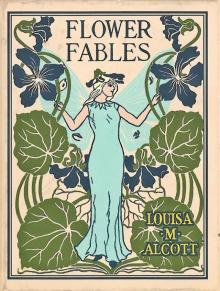 Flower Fables
Flower Fables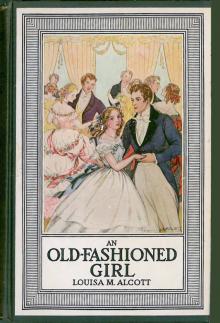 An Old-Fashioned Girl
An Old-Fashioned Girl The Candy Country
The Candy Country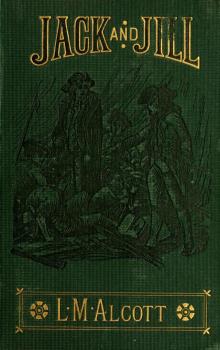 Jack and Jill
Jack and Jill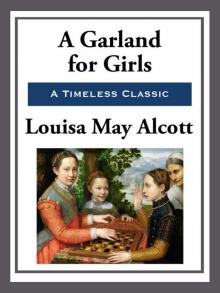 A Garland for Girls
A Garland for Girls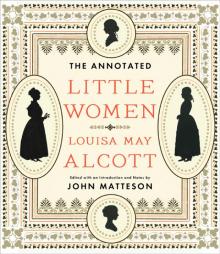 The Annotated Little Women
The Annotated Little Women A Classic Christmas
A Classic Christmas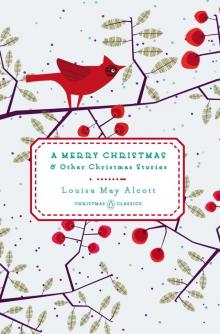 A Merry Christmas
A Merry Christmas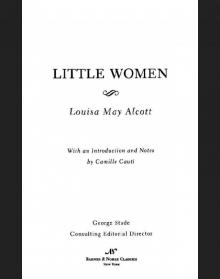 Little Women (Barnes & Noble Classics Series)
Little Women (Barnes & Noble Classics Series)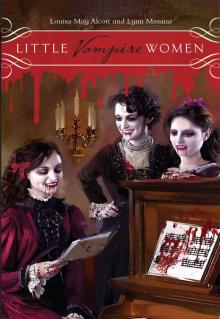 Little Vampire Women
Little Vampire Women